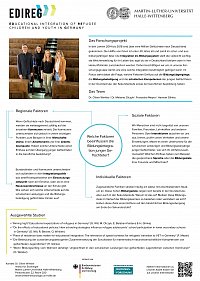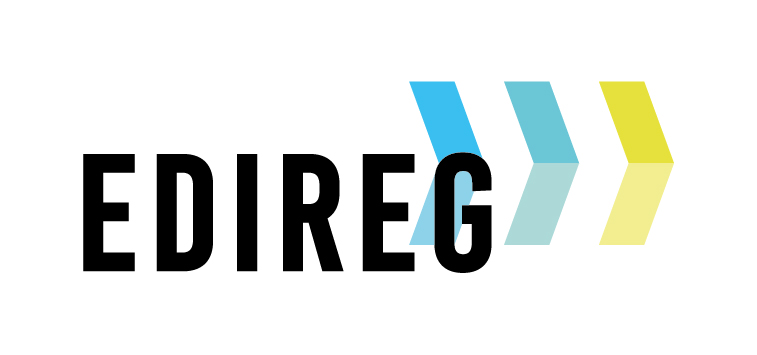Überblick

EDIREG-Poster
Hintergrund
Geflüchtete Heranwachsende befinden sich in einer besonderen Bildungssituation. Biografien von geflüchteten Kindern und Jugendlichen sind in einer kritischen Entwicklungsphase durch Krisen, lebensbedrohliche und traumatische Ereignisse, Trennung von Angehörigen und Peers sowie durch materielle Verluste gestört worden. Am Aufnahmeort müssen sie zusätzlich enormen akkulturativen Stress bewältigen, der sich aus langwieriger und ungewisser Zuerkennung eines Schutzstatus, ungünstigen Aufnahme- und Unterbringungsbedingungen oder regional unterschiedlich ausgeprägter Willkommenskultur ergeben kann. Im Zuge der Corona-Pandemie wächst die Sorge, dass sich die schwierige Bildungssituation von geflüchteten Kindern und Jugendlichen weiter verschärft. Bisher wurde jedoch nur wenig untersucht, wie die Bildungsintegration geflüchteter Kinder und Jugendlicher gegenwärtig verläuft.
Ziele
Wir untersuchen die Rolle von familiären und schulischen Bedingungen für den Bildungserfolg von Kindern und Jugendlichen mit Fluchterfahrung im regionalen Vergleich. Im Fokus steht die Bildungsungleichheit an Bildungsübergängen (z.B. Grundschulübergang, Klassenwiederholungen), bei der Bildungsbeteiligung (z.B. am Gymnasium) und beim Erwerb schulischer Kompetenzen (z.B. Lesen und Mathematik). Diese Prozesse werden in der Grundschule, der Sekundarstufe und der Berufsausbildung untersucht. Wir gehen davon aus, dass Bildungsintegration geflüchteter Heranwachsender auf allen Bildungsstufen ein Mehrebenenprozess ist. Das bedeutet, dass regionale Aufnahmekontexte (z.B. Schulsysteme, Willkommenskultur, Fremdenfeindlichkeit, strukturschwache/-starke Regionen) sowie formale und informale Lernumgebungen (Schulen, Familien, Gemeinschaften) den Bildungserfolg entweder eröffnen, erleichtern, erschweren oder sogar verhindern können.Um diese Prozesse zu analysieren, werten wir große Bevölkerungsumfragen und Daten aus repräsentativen Schulleistungsstudien und Flüchtlingsstudien aus, die erst seit kurzer Zeit der Wissenschaft zu Auswertungszwecken zur Verfügung stehen.
Um gesellschaftliche Partizipationschancen von geflüchteten Kindern und Jugendlichen zu ermöglichen, ergibt sich für die Bildungspraxis in Deutschland die große Aufgabe, die benötigten Lernbedingungen zur Entfaltung individueller Potentiale der Lernenden bereitzustellen, die Anpassung an den neuen Bildungskontext zu unterstützen, Nachteile aus unterbrochenen Schulverläufen zu kompensieren und dabei auch bereits vorhandenes Wissen und Lernstrategien der Heranwachsenden als individuelle Ressourcen nutzbar zu machen, um schließlich faire Chancen beim Bildungserwerb herzustellen. Die gegenwärtige Situation bietet hierfür durchaus Vorteile: geflüchtete Familien, die 2014/15 zugewandert sind, konnten ihre Deutschkenntnisse bereits verbessern (Brücker et al. 2019), fühlen sich in Deutschland nach wie vor willkommen (Paiva Lareiro et al. 2020) und konnten Kontakthäufigkeiten mit Deutschen (Siegert 2019) sowie ihre soziale Einbindungen noch weiter steigern (Brücker et al. 2020). EDIREG leistet hierzu einen wichtigen Untersuchungsbeitrag, indem wir analysieren, ob und wie - angesichts der besonderen Lernsituation - Bildungserfolge an den verschiedenen Etappen bzw. kritischen Übergängen des Bildungsverlaufs gelingen und welche potentiellen Hürden ausgemacht werden können.
Mit ca. 300.000 geflüchteten Schülerinnen und Schülern ist die soziale Vielfalt in den Klassenzimmern gestiegen, aber auch oft begleitet von geringen Deutschkenntnissen und eingeschränkten schulischen Unterstützungsmöglichkeiten der Eltern. Deshalb ist zusätzliche schulische Förderung dringend notwendig. Die Nachwuchsforschungsgruppe fragt hierzu: Wie effektiv sind die Förderinstrumente der Bildungspolitik? Minderjährige aus schutzsuchenden Familien sind schulpflichtig, allerdings regeln Schulgesetze vor allem nur die Anwesenheit, nicht aber die Ausgestaltung der Förderung. Gleichzeitig bestehen zum Teil mangelnde Kapazitäten in den Schulen, Sprachbarrieren oder auch wenig Wissen über die Kompetenzstände der jungen Geflüchteten. Auch im Berufsbildungssystem werden langwierige Asylverfahren und unsichere Aufenthaltsstatus, regionale und berufsspezifische Versorgungsengpässe oder unzureichende Deutschkenntnisse als Integrationshemmnisse kritisiert. Die Bundesländer sind dabei sehr unterschiedlich auf diese Herausforderungen vorbereitet. Aus diesem Grund wird die Nachwuchsforschungsgruppe untersuchen, welche institutionellen Unterstützungsmöglichkeiten für die Bildungsintegration förderlich sind.



